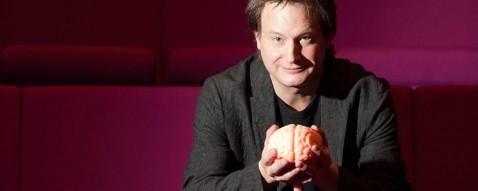Published: January 24, 2012

Image:Emory University
A neuro-imaging study shows that personal values that people refuse to disavow, even when offered cash to do so, are processed differently in the brain than those values that are willingly sold.
“Our experiment found that the realm of the sacred – whether it’s a strong religious belief, a national identity or a code of ethics – is a distinct cognitive process,” says Gregory Berns, director of the Center for Neuropolicy at Emory University and lead author of the study. The results were published in Philosophical Transactions of the Royal Society.
Sacred values prompt greater activation of an area of the brain associated with rules-based, right-or-wrong thought processes, the study showed, as opposed to the regions linked to processing of costs-versus-benefits.
Berns headed a team that included economists and information scientists from Emory University, a psychologist from the New School for Social Research and anthropologists from the Institute Jean Nicod in Paris, France. The research was funded by the U.S. Office of Naval Research, the Air Force Office of Scientific Research and the National Science Foundation.
“We’ve come up with a method to start answering scientific questions about how people make decisions involving sacred values, and that has major implications if you want to better understand what influences human behavior across countries and cultures,” Berns says. “We are seeing how fundamental cultural values are represented in the brain.” Link to continue reading
Find the original article here
Source: Emory University
Published: January 19, 2012

istockphoto
ew research from
Uppsala University shows that a specific brain region that contributes to a person’s appetite sensation is more activated in response to food images after one night of sleep loss than after one night of normal sleep. Poor sleep habits can therefore affect people’s risk of becoming overweight in the long run. The findings are published in
The Journal of Clinical Endocrinology & Metabolism.
Researchers Christian Benedict and Helgi Schiöth, of the Department of Neuroscience at Uppsala University, showed in an earlier article, published in American Journal of Clinical Nutrition, that a single night of total sleep loss in young normal weight men curbed the energy expenditure the next morning. This research also showed that subjects had increased levels of hunger, which indicates that an acute lack of sleep may affect human’s food perception.
In a new study, Christian Benedict, together with Samantha Brooks, Helgi Schiöth and Elna-Marie Larsson from Uppsala University and researchers from other European universities, have now systematically examined which regions in the brain, involved in appetite sensation, are influenced by acute sleep loss. By means of magnetic imaging (fMRI) the researchers studied the brains of 12 normal-weight males while they viewed images of foods. The researchers compared the results after a night with normal sleep with those obtained after one night without sleep.
Christian Benedict explains:
“After a night of total sleep loss, these males showed a high level of activation in an area of the brain that is involved in a desire to eat. Bearing in mind that insufficient sleep is a growing problem in modern society, our results may explain why poor sleep habits can affect people’s risk to gain weight in the long run. It may therefore be important to sleep about eight hours every night to maintain a stable and healthy body weight.”
Source: Uppsala Universitet
Published: January 7, 2012
Meet Your Brain

Image: The Royal Institution
The Royal Institution’s 2011 Christmas lectures are now available to view online
Published: December 27, 2011

Image: istockphoto
oth children and the elderly have slower response times when they have to make quick decisions in some settings.
But recent research suggests that much of that slower response is a conscious choice to emphasize accuracy over speed.
In fact, healthy older people can be trained to respond faster in some decision-making tasks without hurting their accuracy – meaning their cognitive skills in this area aren’t so different from younger adults.
“Many people think that it is just natural for older people’s brains to slow down as they age, but we’re finding that isn’t always true,” said Roger Ratcliff, professor of psychology at Ohio State University and co-author of the studies.
“At least in some situations, 70-year-olds may have response times similar to those of 25-year olds.”
Ratcliff and his colleagues have been studying cognitive processes and aging in their lab for about a decade. In a new study published online this month in the journal Child Development, they extended their work to children.
Ratcliff said their results in children are what most scientists would have expected: very young children have slower response times and poorer accuracy compared to adults, and these improve as the children mature.
But the more interesting finding is that older adults don’t necessarily have slower brain processing than younger people, said Gail McKoon, professor of psychology at Ohio State and co-author of the studies.
“Older people don’t want to make any errors at all, and that causes them to slow down. We found that it is difficult to get them out of the habit, but they can with practice,” McKoon said. [continue reading…]




